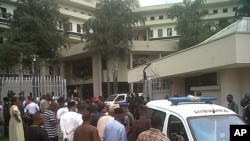U.N. Secretary-General Ban Ki-moon has strongly condemned a car bomb attack on a United Nation's office in the Nigerian capital. Friday's attack is one of the most deadly in the world body's history, with at least 18 dead and many more wounded.
Ban said at 11 in the morning local time, a car bomber attacked the Abuja compound, which houses 26 humanitarian and development agencies and hundreds of staff.
"We do not yet have precise casualty figures but they are likely to be considerable," said Ban. "A number of people are dead; many more are wounded."
Ban said he is dispatching his deputy, Asha Rose Migiro, who was in Addis Ababa for an African Union meeting, to the Nigerian capital immediately to assess the situation. She will be accompanied by the U.N.'s security chief Gregory Starr.
There was no immediate claim of responsibility, but suspicion fell on Boko Haram, an Islamist group with links to al-Qaida that has claimed other bombings in Nigeria.
A few hours after the blast, a Boko Haram spokesman telephoned a correspondent for VOA's Hausa service and said the group carried out the attack and warned that "this is just the beginning." The spokesman said the bombing was in response to the government's sending more troops to Nigeria's northeastern Borno state. The soldiers were sent there to stabilize the security situation after an increase in suspected Boko Haram assassinations and bombings.
Meanwhile, a U.N. spokesman in New York, Farhan Haq, told reporters that there had been no previous threat on the U.N. Abuja compound and that it was a well-protected facility, including by a series of barriers and gates.
"The car got through a couple of gates that were defended by security guards," said Haq. "How that happened, how they got past security, we will have to determine how that was the case. But we will try to investigate how our defenses were breached."
Haq said the U.N. has been increasing its security at facilities worldwide to fortify buildings against the evolving and varied threats they face.
At U.N. headquarters, there was a visibly increased presence of armed security and city police outside the building following Friday's events.
In the U.N. Security Council a moment of silence was observed. The Secretary-General then told the council that the Abuja attack would not deter the United Nations from its vital work, but he warned that threats to the institution are growing.
"This outrageous and shocking attack is evidence that the U.N premises are increasingly being viewed as soft targets by extremist elements around the world," added Ban.
The U.N. suffered its deadliest attack on August 19th , 2003 when a suicide bomber struck its headquarters in Baghdad. A total of 22 people were killed, including the chief of the mission.
In December 2007, the U.N. compound in the Algerian capital, Algiers, was also hit. Seventeen staff were killed and 40 others injured. The head of U.N. security resigned over charges of security lapses that may have prevented the attack.
Some information for this report was provided by AP, AFP and Reuters.
Related video




